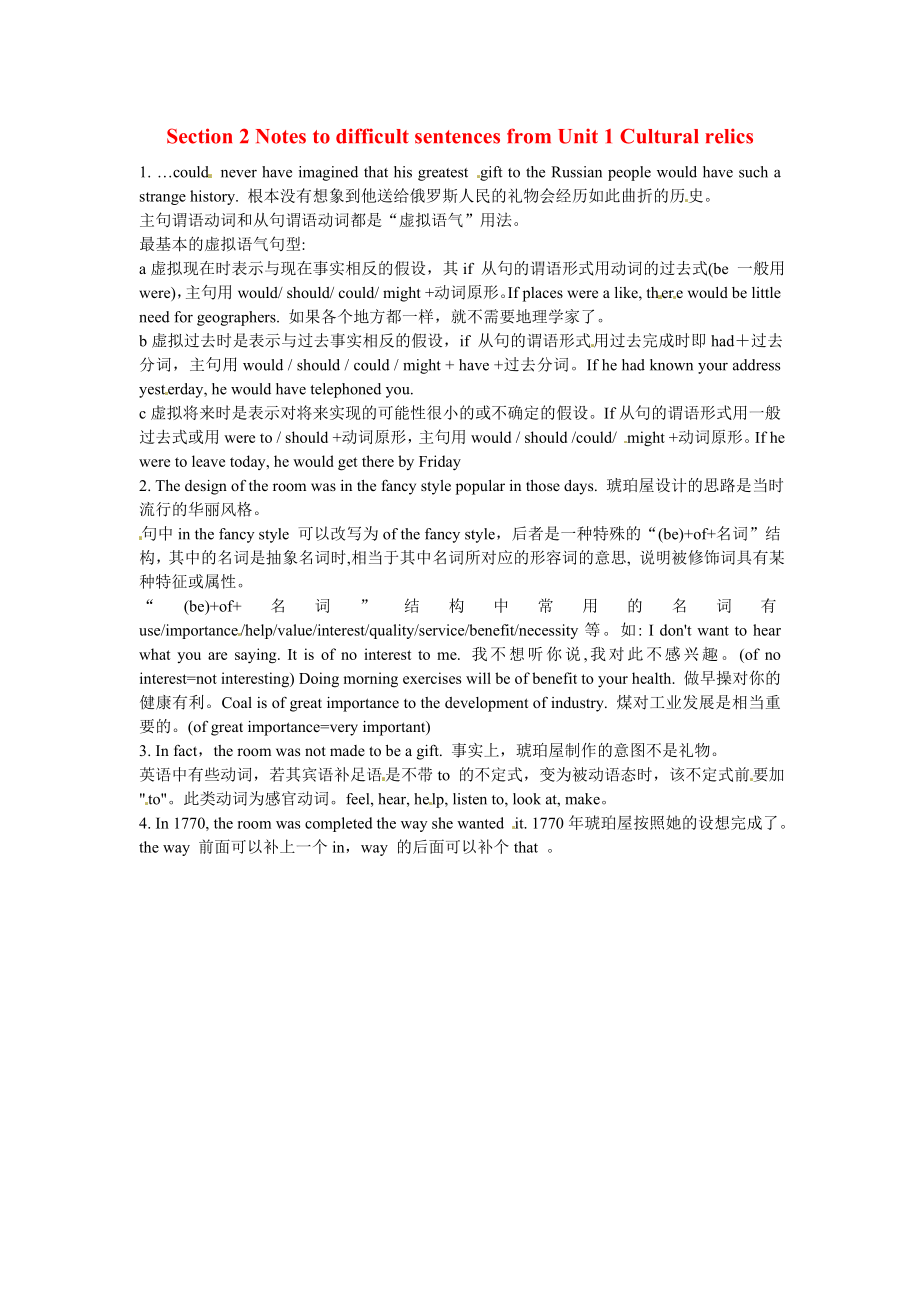《浙江省2013年高中英語 Unit1 cultural relics疑難解析 新人教版必修2》由會(huì)員分享���,可在線閱讀��,更多相關(guān)《浙江省2013年高中英語 Unit1 cultural relics疑難解析 新人教版必修2(1頁珍藏版)》請?jiān)谘b配圖網(wǎng)上搜索����。
1���、Section 2 Notes to difficult sentences from Unit 1 Cultural relics
1. …could never have imagined that his greatest gift to the Russian people would have such a strange history. 根本沒有想象到他送給俄羅斯人民的禮物會(huì)經(jīng)歷如此曲折的歷史���。
主句謂語動(dòng)詞和從句謂語動(dòng)詞都是“虛擬語氣”用法。
最基本的虛擬語氣句型:
a虛擬現(xiàn)在時(shí)表示與現(xiàn)在事實(shí)相反的假設(shè)���,其if 從句的謂語形式用動(dòng)詞的過去式(be 一般用were)����,主
2���、句用would/ should/ could/ might +動(dòng)詞原形��。If places were a like, there would be little need for geographers. 如果各個(gè)地方都一樣�����,就不需要地理學(xué)家了���。
b虛擬過去時(shí)是表示與過去事實(shí)相反的假設(shè)�����,if 從句的謂語形式用過去完成時(shí)即had+過去分詞�����,主句用would / should / could / might + have +過去分詞���。If he had known your address yesterday, he would have telephoned you.
c虛擬將來時(shí)是表示對
3、將來實(shí)現(xiàn)的可能性很小的或不確定的假設(shè)�。If從句的謂語形式用一般過去式或用were to / should +動(dòng)詞原形,主句用would / should /could/ might +動(dòng)詞原形����。If he were to leave today, he would get there by Friday
2. The design of the room was in the fancy style popular in those days. 琥珀屋設(shè)計(jì)的思路是當(dāng)時(shí)流行的華麗風(fēng)格��。
句中in the fancy style 可以改寫為of the fancy style�����,后者是一種特殊的
4、“(be)+of+名詞”結(jié)構(gòu)����,其中的名詞是抽象名詞時(shí),相當(dāng)于其中名詞所對應(yīng)的形容詞的意思, 說明被修飾詞具有某種特征或?qū)傩浴?
“(be)+of+名詞”結(jié)構(gòu)中常用的名詞有use/importance/help/value/interest/quality/service/benefit/necessity等。如: I don't want to hear what you are saying. It is of no interest to me. 我不想聽你說,我對此不感興趣����。(of no interest=not interesting) Doing morning exercises
5、will be of benefit to your health. 做早操對你的健康有利�。Coal is of great importance to the development of industry. 煤對工業(yè)發(fā)展是相當(dāng)重要的。(of great importance=very important)
3. In fact���,the room was not made to be a gift. 事實(shí)上�����,琥珀屋制作的意圖不是禮物�。
英語中有些動(dòng)詞�����,若其賓語補(bǔ)足語是不帶to 的不定式,變?yōu)楸粍?dòng)語態(tài)時(shí)����,該不定式前要加"to"。此類動(dòng)詞為感官動(dòng)詞�。feel, hear, help, listen to, look at, make。
4. In 1770, the room was completed the way she wanted it. 1770年琥珀屋按照她的設(shè)想完成了�����。
the way 前面可以補(bǔ)上一個(gè)in����,way 的后面可以補(bǔ)個(gè)that 。
 浙江省2013年高中英語 Unit1 cultural relics疑難解析 新人教版必修2
浙江省2013年高中英語 Unit1 cultural relics疑難解析 新人教版必修2
